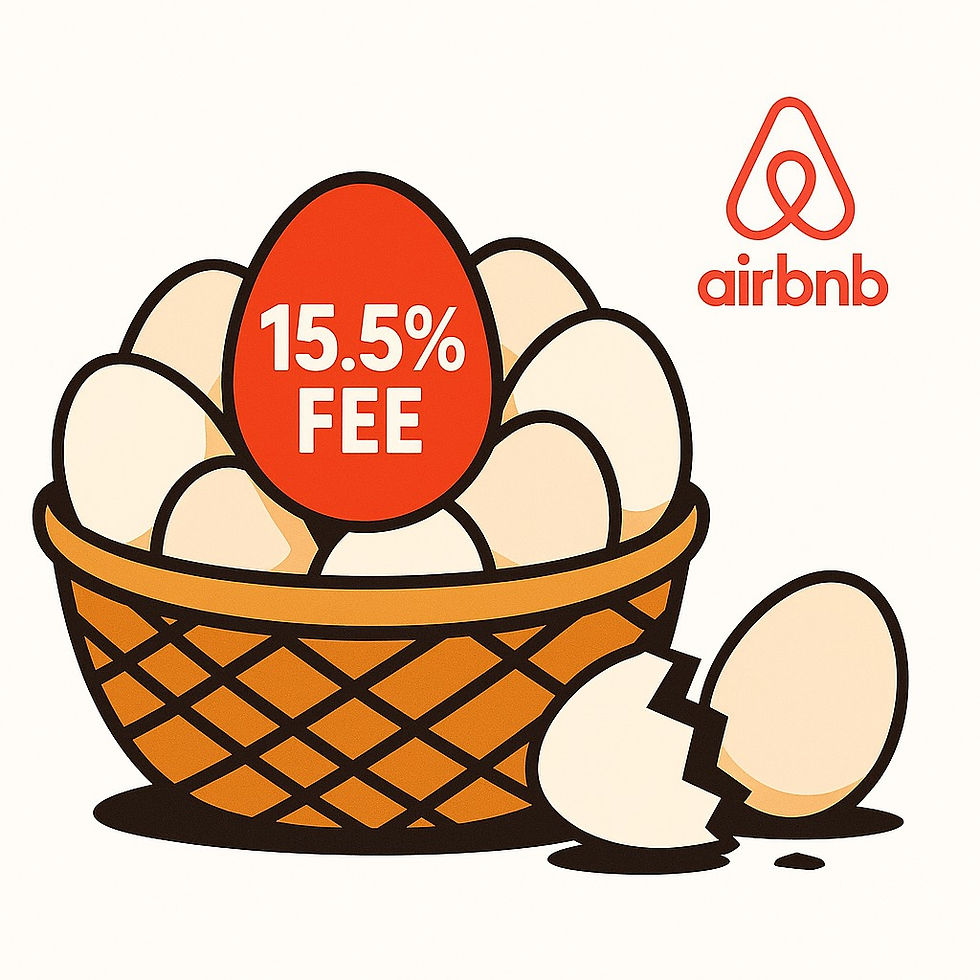Airbnb Fees Update 2025: What Hosts Need to Know and How to Protect Your Business
- Kin Marketing
- Sep 2, 2025
- 4 min read

Airbnb has once again changed how it charges hosts and guests in 2025, sparking frustration across the short-term rental community. While the company says the move “simplifies” pricing, many hosts see it as another way Airbnb reduces transparency and control.
In this article, we’ll cover:
A short history of Airbnb fee changes
What the 2025 fee update looks like
Why the change matters for hosts (explained simply and in detail)
How this will impact the short-term rental industry
Why direct bookings are more important than ever

A Short History of Airbnb Fees
When Airbnb first grew in popularity, it adopted a split fee model:
Hosts paid around 3% in service fees
Guests paid 14–16% on top of the nightly rate
This created a dynamic where hosts had very low costs, while guests carried most of the burden. Over time, Airbnb has gradually experimented with fee structures, including:
2019: Launch of the Host-Only Fee model, where professional hosts using channel managers or property management software (PMS) could opt into paying a higher fee (~14–15%) so guests saw fewer added charges.
2020–2023: Increased pressure on hosts to adopt “all-inclusive pricing” to improve the guest experience and reduce complaints about surprise fees.
2024: Airbnb tested its “single fee” system in multiple countries, preparing for a wider rollout.
By mid-2025, this test ended—Airbnb officially moved toward a unified fee structure worldwide.

What Is Airbnb’s 2025 Fee Update?
In August 2025, Airbnb introduced a “single service fee” model where hosts now pay around 15.5% flat fee, and guests see only one all-inclusive price at checkout.
According to Rental Scale-Up, this means:
Hosts connected through PMS or channel managers are required to use the new model.
Smaller independent hosts will eventually follow, as Airbnb phases out the old split system.
Airbnb is marketing this as a “simpler” and “fairer” experience for guests.
But for hosts, the consequences are more complex.

Airbnb Fees Explained Like You’re 5
Imagine you bake cookies and sell them for $100.
Before the update: The store (Airbnb) takes $3 from you. The buyer (guest) pays about $115 total ($100 + store fees). You keep $97.
After the update: The store now takes $15.50 from you. The buyer still pays $115. You keep $97.
So, on paper, not much changes… right?
The issue is that you no longer control how your fees are shown to the customer. Before, you could explain, “Hey, those extra charges aren’t mine, they’re Airbnb’s.” Now, the price looks like it’s fully yours, even though Airbnb is still taking its cut.

Why the 2025 Fee Update Matters for Hosts
1. Less Transparency and Control
Hosts lose the ability to separate Airbnb’s costs from their own nightly rate. Guests might blame you for higher prices when in reality, it’s Airbnb’s flat fee structure.
2. Higher Visibility Risks
Airbnb’s algorithm heavily weighs “price competitiveness.” With higher host-side fees, you may have to raise rates or absorb costs, just to stay visible. This could push some hosts lower in search results.
3. Unequal Implementation
Currently, PMS-connected hosts are the first forced into this model, while smaller hosts aren’t (yet). This creates unfair competition across listings.
4. Industry-Wide Impact
With Airbnb leading the STR market, competitors like Vrbo (with ~8% fees) and Booking.com may become more attractive to both hosts and guests. This could shift booking patterns across the industry.

Host Reactions to the Airbnb Fee Change
Early host reactions have been mixed:
Some welcome the simplified experience for guests, saying fewer complaints about “Airbnb fees” may help conversion.
Others worry that Airbnb has taken away their last bit of flexibility in pricing. As The Host Report puts it, “Airbnb has shifted the entire burden onto hosts while framing it as a guest-friendly move.”
For many, it’s not just about money, it’s about losing independence in how they run their business.
How This Could Change the Short-Term Rental Industry
This update signals Airbnb’s continued push to look more like a traditional hotel booking platform. As fees standardize, the “peer-to-peer” feeling of Airbnb is fading.
For large property managers, this means they’ll need to carefully adjust pricing strategies to stay competitive. For smaller independent hosts, it may be harder to stand out if fees eat into already slim margins.
In short: Airbnb’s dominance means the whole industry has to adapt. Or not?

How Hosts Can Protect Themselves
While Airbnb’s fee change is out of your control, your business strategy isn’t. Many professional hosts have been preparing for this shift for years by diversifying their booking channels.
The most effective solution? Building your own direct booking website.
With direct bookings, you:
Keep 100% of the nightly rate (no 15.5% taken by Airbnb)
Own your guest relationships and data
Have full control over your pricing, policies, and branding
Pairing your website with social media marketing, email campaigns, and Google Business Profile optimization ensures guests can find you without relying on Airbnb or Vrbo.
Those who already started building their networks years ago won’t feel the impact of this update nearly as much. For everyone else, now is the time to act.
Final Thoughts on Airbnb Fees and Adapting to them
Airbnb’s 2025 fee update is one of the biggest shifts the platform has made in years. By moving to a single host-only fee, Airbnb is making booking “simpler” for guests, but reducing flexibility and transparency for hosts.
Whether this model benefits you depends on how well you adapt. Those who rely 100% on Airbnb will feel the squeeze. Those who build strong direct booking systems and diversify their marketing will not only survive this change, they’ll thrive in it.
Airbnb may be the industry leader, but it doesn’t have to control your entire business.



Comments